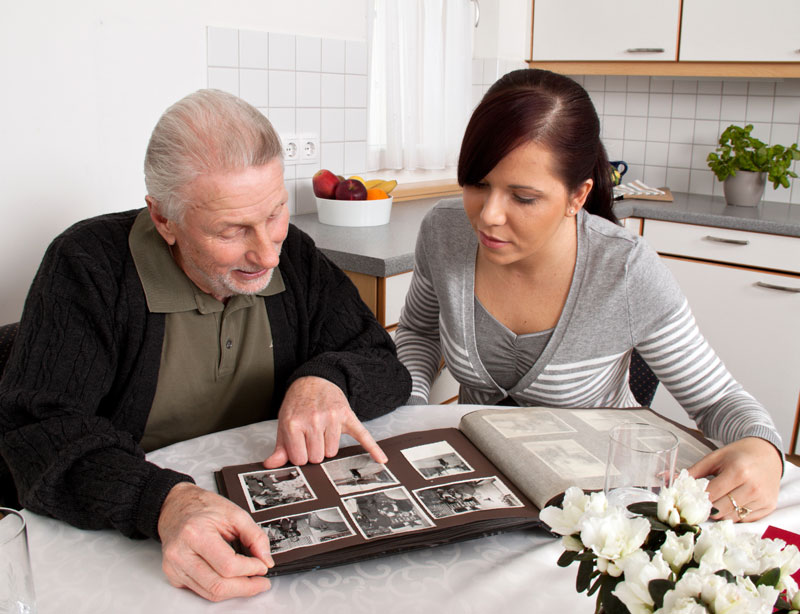All of us respond to our senses. Whether it’s a gentle touch or tasting food that reminds us of our childhood, sensory stimulation can activate many memories. Taste, smell, sight, hearing and touch are the 5 major senses and we use a combination of them to understand our surroundings. We need stimulation, although a healthy person will also spend much of a day tuning out and into our environments as we interact with the world.
Is sensory stimulation beneficial to those with dementia?
For those with cognitive illnesses, they struggle to make sense of their changing lives. The right type of stimulation may reduce anxiety and depression, as well as increase their social interaction and ability to communicate. Sensory stimulation can be calming, as well as help them access memories that may improve their mood and physical responses.
A few of the benefits include:
- Improving daily function
- Encouraging participating in social groups
- Increased concentration
- Improved communication with others
- A chance for them to enjoy resurfaced memories from childhood and the past
How to use sensory stimulation
Since you are trying to trigger a connection, you’ll want your activities to provide a link to the person’s interests, background and preferences. Include other family members or friends who may be able to help provide this type of information if needed.
Trial and error may be required as you try to find the best way to connect. It’s a great example of person-centered care, as the type of stimulation needs to be tailored to the individual. Although some activities can involve multiple senses, it’s typically recommended to only try to stimulate one sense at a time.
Sensory stimulation activities
Depending on your loved one and the connections you are trying to make, it’s fairly simple to find ways to work with the senses.
1. The sense of smell
There are several ways to introduce the sense of smell, including a few that may be right in your own kitchen or backyard:
*Bring in cut and fragrant flowers. Bright blooms can also active the visual senses
*Create a sensory garden to enjoy together that could include aromatic plants, herbs and spices. Wind chimes and a water fountain will provide sound and touch opportunities
*Experiment with the many different scents of aromatherapy
*Scented hand creams provide a sense of smell, but also a comforting touch if you give a gentle hand or foot massage
*Try filling sachets with cinnamon, cloves, thyme or other scents
2. The sense of taste
There are unlimited options when it comes to taste. Try different foods that match up to different memories, including:
*Their favorite foods
*Cook a favorite meal from childhood
*Try different desserts they loved with distinctive tastes and textures
*Offer different foods that are sweet, savory or spicy
3. The sense of touch
The sense of touch communicates information as well as emotions. Whether it’s a massage, holding hands or feeling the air temperature against our skin, touch sends messages to our brain and can stir our memories. Consider trying these options:
*Bring in different textures to touch and feel in their hands or against their face, including feathers, velvet, bubble wrap or wood
*Try different touch sensations such as constant or differing pressure or the sense of vibration
*Offer a facial, manicure or pedicure as a loving and comforting gesture
*Go outside and let them feel the sunshine, raindrops or snowflakes on their face and skin
*Bring in a favorite animal for a visit that they can stroke or pet
4. The sense of sight
For many, sight is the strongest sense and using stimulation to help a loved one with dementia or Alzheimer’s, and this sense can be quite powerful. Try these suggestions:
*Create together or bring in a mobile they could hang in their room that is made of interesting shapes and materials, bright colors or includes photos of people close to them
*Plant something outside their window they can watch grow or take a walk outside in the community’s garden to experience the different sizes, shapes and colors
*Taking a trip to a botanical garden can also offer these beautiful sights as well as interesting designs and layouts. And don’t forget people watching
*Hang a bird feeder outside their window if allowed and try to attract different birds that they can watch
*Bring in photo albums to flip through filled with pictures and mementos from their childhood
5. The sense of sound
We’ve all experienced the sensation of hearing a song from years ago and instantly find ourselves back in that time. The same response occurs for those with dementia. We are surrounded by sound so you’ll have no trouble finding options, but here are a few suggestions:
*Go outside and experience different sounds of organic or manmade nature, whether it’s the birds singing, the wind blowing, waterfalls or even the traffic
*Listen to favorite songs or music from their past
*Enjoy the sounds of chimes, bells or other instruments
*Read expressively from their favorite books or poems
Ingleside at King Farm Memory Support Assisted Living community
We understand the importance of sensory stimulation and how it can help trigger memories of those with a cognitive illness, as well as provide a calming or pleasant response. We can help you explore the different possibilities of using senses to help communicate with your loved one. Bringing a whole-person approach when caring for our residents, sensory stimulation offers the perfect opportunity to discover and delight your loved one with memories from their own past.
Call (240) 455-4582 if you have any questions or would like to schedule a virtual tour today.

